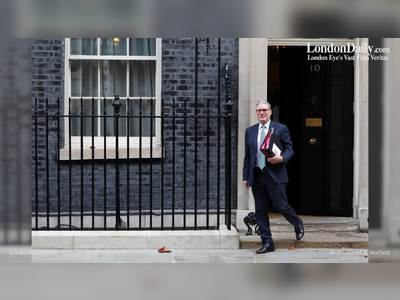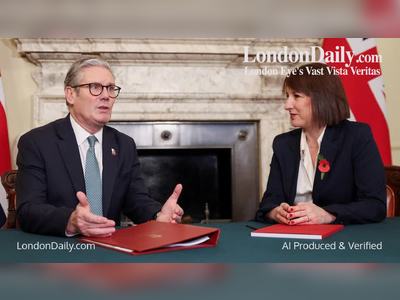Starmer Faces Mounting Turmoil as Leaked Briefings Ignite Leadership Plot Rumours
Prime minister condemns anonymous claims suggesting senior ministers are preparing to challenge his position
Prime Minister Keir Starmer has moved to contain a wave of speculation over his leadership after leaked briefings from unnamed allies suggested he could face a challenge as early as next year.
The reports, published on Tuesday evening, claimed Health Secretary Wes Streeting had secured growing support to replace him, prompting an immediate political storm inside the Labour Party.
Streeting firmly rejected the claims, telling reporters he was “not challenging the prime minister” and condemning the anonymous briefers as damaging to the government’s credibility.
He said those responsible should be removed from their roles, noting that such behaviour reflects a culture that does not align with Starmer’s stated leadership style.
Speaking in north Wales, Starmer denounced the briefings as “completely unacceptable” and said he had received assurances that none of the allegations originated from Number 10. He reaffirmed confidence in his team and insisted his government remains focused on delivering its domestic agenda rather than engaging in internal disputes.
The episode has highlighted Starmer’s weakening position within the party after months of declining poll numbers and public dissatisfaction over policy missteps.
A recent national survey showed only twenty-seven percent of respondents believed he should remain as Labour leader.
Senior Labour figures have suggested that a leadership contest, if it emerged, would be most likely after the autumn budget later this month or following local elections next May should the party perform poorly.
Names floated as possible successors include Streeting, Home Secretary Shabana Mahmood and Energy Secretary Ed Miliband, though none have indicated any move against the prime minister.
Under Labour rules, any challenger would need the backing of twenty percent of MPs to trigger a leadership race — a significant hurdle without coordinated support from senior ministers.
Speculation has also turned toward Starmer’s chief of staff, Morgan McSweeney, with some MPs suggesting he may have orchestrated the leak as a deterrent to would-be challengers.
Starmer dismissed calls for McSweeney’s resignation, reiterating he has “complete confidence” in his chief adviser.
Opposition parties seized on the turmoil.
Conservative leader Kemi Badenoch accused Starmer of losing control of both his cabinet and his party, while Reform UK argued the unrest underscored widespread dissatisfaction with Labour’s direction.
The government’s upcoming budget on 26 November — once expected to feature potential tax increases — now appears to be shifting strategy, with the chancellor ruling out rises to income tax amid concern over voter backlash.
The leadership speculation comes against the backdrop of a stagnating economy, rising far-right mobilisation and operational failures within government, all weighing on Starmer’s authority.
Analysts say the briefing saga has reinforced doubts about the prime minister’s political judgement and underscored the fragility of unity within his party as it approaches a series of critical tests.
The reports, published on Tuesday evening, claimed Health Secretary Wes Streeting had secured growing support to replace him, prompting an immediate political storm inside the Labour Party.
Streeting firmly rejected the claims, telling reporters he was “not challenging the prime minister” and condemning the anonymous briefers as damaging to the government’s credibility.
He said those responsible should be removed from their roles, noting that such behaviour reflects a culture that does not align with Starmer’s stated leadership style.
Speaking in north Wales, Starmer denounced the briefings as “completely unacceptable” and said he had received assurances that none of the allegations originated from Number 10. He reaffirmed confidence in his team and insisted his government remains focused on delivering its domestic agenda rather than engaging in internal disputes.
The episode has highlighted Starmer’s weakening position within the party after months of declining poll numbers and public dissatisfaction over policy missteps.
A recent national survey showed only twenty-seven percent of respondents believed he should remain as Labour leader.
Senior Labour figures have suggested that a leadership contest, if it emerged, would be most likely after the autumn budget later this month or following local elections next May should the party perform poorly.
Names floated as possible successors include Streeting, Home Secretary Shabana Mahmood and Energy Secretary Ed Miliband, though none have indicated any move against the prime minister.
Under Labour rules, any challenger would need the backing of twenty percent of MPs to trigger a leadership race — a significant hurdle without coordinated support from senior ministers.
Speculation has also turned toward Starmer’s chief of staff, Morgan McSweeney, with some MPs suggesting he may have orchestrated the leak as a deterrent to would-be challengers.
Starmer dismissed calls for McSweeney’s resignation, reiterating he has “complete confidence” in his chief adviser.
Opposition parties seized on the turmoil.
Conservative leader Kemi Badenoch accused Starmer of losing control of both his cabinet and his party, while Reform UK argued the unrest underscored widespread dissatisfaction with Labour’s direction.
The government’s upcoming budget on 26 November — once expected to feature potential tax increases — now appears to be shifting strategy, with the chancellor ruling out rises to income tax amid concern over voter backlash.
The leadership speculation comes against the backdrop of a stagnating economy, rising far-right mobilisation and operational failures within government, all weighing on Starmer’s authority.
Analysts say the briefing saga has reinforced doubts about the prime minister’s political judgement and underscored the fragility of unity within his party as it approaches a series of critical tests.









